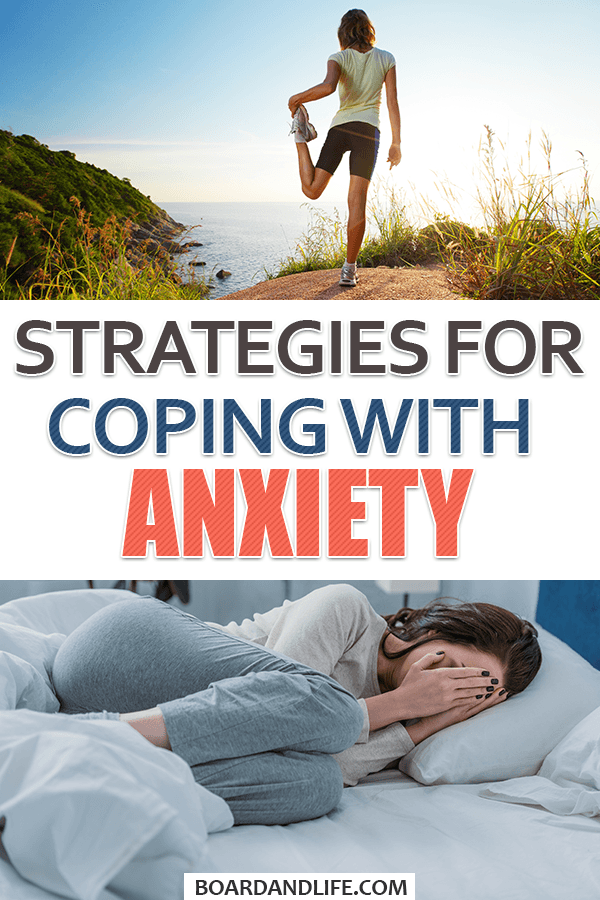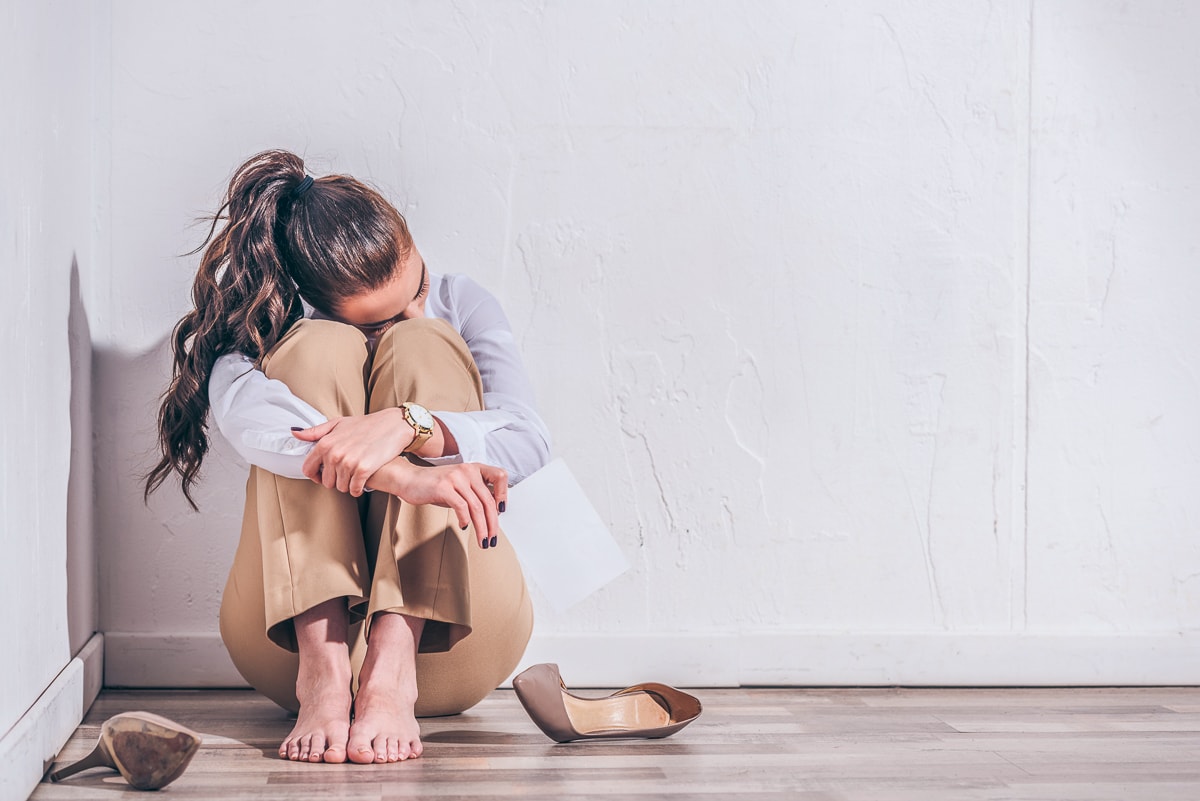A Few Coping Strategies for Anxiety You Can Use Right Now!
Let’s face it – anxiety sucks. If you’re here in this post, there’s a good chance you’re interested in dealing with anxiety… probably because you are trying to do just that in your own life. If so, welcome! You’re not alone. Here at Board and Life, we’ve had our share of figuring out how to deal and cope with anxiety.
Over time, we’ve realized that it’s not about “beating anxiety” – but dealing with anxiety and managing anxiety in effective, productive ways. The truth is, it’s hard to beat right away. Some argue that it’s hard to beat at all. However, over time you learn coping mechanisms and strategies. These help you deal with anxiety to the point where it’s no longer there.
We know this because years ago, Bruce was there in that spot. These days, his anxiety is in check. It pops up every once in a while, but it’s nothing he can’t handle because he learned to cope and removed the stressors from his life.
So, you help you on your journey, here are a few more of the strategies that he used years ago that worked for him. Obviously, some of these strategies will work for some and not others. It’s important to try different things, listen to your body, and don’t be afraid to ask for help. Here are 14 coping strategies for anxiety to reduce your anxiety day in and day out.
Disclaimer: We are not medical professionals and are purely speaking from personal experience. These are things that have helped us with our anxiety. If you suffer from anxiety, please consult a medical professional for any questions and concerns.
Table of Contents
Breathe
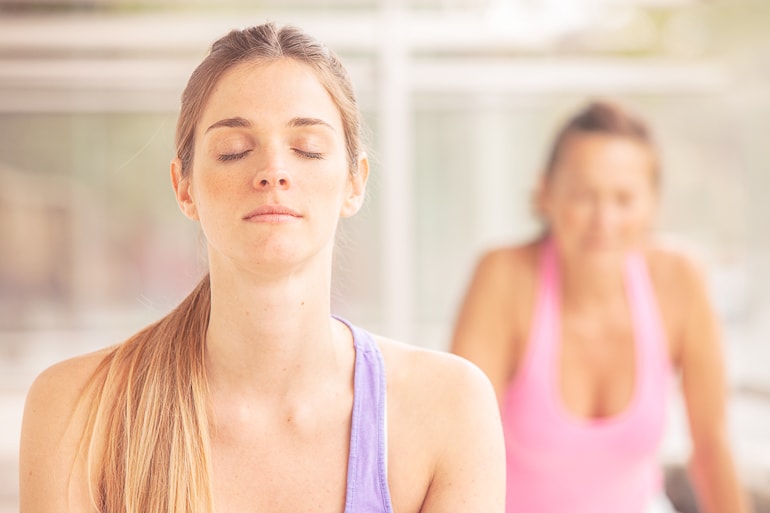
Seems like a simple and obvious one but it’s one that we often forget to do when we’re in the heat of an anxious mind session. Focus on your breathing. Take long, deep breaths. Feel the air go in, hold it, feel the air go out. Exhale the negativity with it. Repeat. Repeat as often as you need – like the moment you feel anxious thoughts creeping in. Stop and breathe.
Focussing on breathing is definitely something borrowed from the ideals of yoga. Yoga, as an activity and a lifestyle, is super important in this day and age. While we don’t talk about yoga specifically here as one of the tips, that is because it falls under a few of the tips below like exercise, practicing mindfullness, shifting your mindset, and mantras!
You can even incorporate counting or other mantras like “I am here, and here is here”. It helps to acknowledge your place in the present, physical moment. Nothing else exists. The power of breathing and repeatable mantras cannot be understated – so you can check out these powerful mantras for dealing with anxiety that pops up!
Talk to Someone

One of the best ways to deal with anxiety and reduce it is to get your thoughts out. Pen and paper can work, but verbally is also a good way to do it.
Actually articulating what you are feeling can go a long way. Got a venting buddy? Someone who will listen and also offer a little feedback? Get one. Having someone who will listen to your word vomit – even if it is word vomit – can help you line up what’s in your head.
There are also phone lines set up specifically to listen to you vent. Depending on where you are located, research the number for the mental health hotline or call number.
Part of Bruce’s problem was thinking no one cared/wanted to listen. The moment he got what was on his brain out to someone was the same moment the weight in the chest immediately lessened. Honestly.
Use Apps for Mindfulness/Anxiety Reduction
Our world is full of technology these days. Part of us thinks that it contributes to the stressors we face. But, if we are stuck with technology, let’s harness it for good.
There are some amazing apps out there which you can download and follow that can help reduce stress and anxiety. From mindfulness apps to apps for breathing techniques, the amount of paid and free apps is mind-boggling!
Bruce really likes Headspace. It was recommended by a friend and it has been a great app to use years later. They have all different free and paid sessions for all different ailments you want to tackle.
From meditation to mindfulness, you can download Headspace and give it a go! We’re actually going to be writing up a whole post just on great apps for coping with stress and anxiety so check back soon!
Reduce your Triggers
This one is tricky. We acknowledge that not everyone can simply remove their stressors from their life – but for others, it may be possible. We are also not advocating “simply running from your problems” at every life turn. That said, a reduction in stressors in the short term can be beneficial in reducing anxiety levels to a point where you can deal with the other ones.
Some people might say “well, I am not sure exactly what my stressors are”. This is a valid point. If you want to understand your stressors, use a journal. Buy a journal you will love and cherish. Write them down.
Each time you get anxious, write down what you know: what are you doing? What has changed from 5 minutes ago? You’ll notice a trend over time if you are detailed enough! We have tips for being a better writer and will also write about tips for keeping a journal!
Exercise

It’s no secret that exercise is linked to reducing stress and anxiety. The reasons for this are numerous and physiological but it boils down to chemicals produces in the body and in the brain.
Exercise produces good chemicals that can act as natural painkillers and mood enhancers. Exercise – specifically physical exertion – is also good for occupying the mind and body with something else.
Exercise becomes “a greater stressor” for the body – but in this case, it’s a good kind of stress. We are a fan of running and we also love hiking. The combination of nature and exercise in hiking is great for reducing anxiety levels – and keeping them down. If you want to set goals to achieve through exercise – even better. We can help you set SMART goals if you like!
Eat Healthily

Easier said than done for some – but your body needs to be chemically alright for you to have the best shot at reducing anxiety or keeping it away in the first place. High energy foods rich in what our bodies need are good for our physical health and mental health.
For Bruce, quick foods choices were less stressful to make but ultimately didn’t help his body to heal and stay resilient in combating stress and anxious thoughts. Eating healthier (more vegetables, less processed food) really helped give his body a chance at being chemically healthy.
Read Also: How To Eat Healthy When You Have No Time
Stay Hydrated
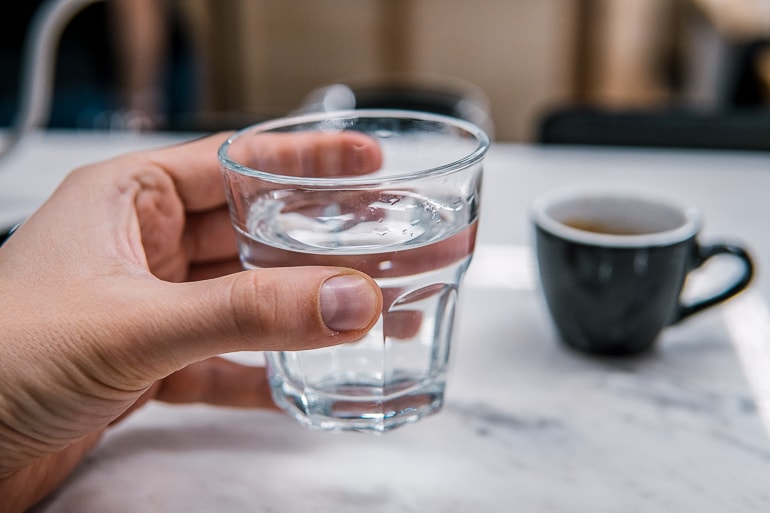
Water is so important. We are basically made up entirely of water so it should come as no surprise that if we don’t have enough of it, our bodies won’t run right. Staying hydrated is more than just drinking whatever throughout the day. Water is the best thing for you. Period.
Having enough water is one less stressor that your body doesn’t have to deal with. This can clear your mind for dealing with larger problems or anxieties. We wrote a whole post on tips that you can use to sneak more water into your daily routine – and actually, enjoy it!
Get Enough Sleep
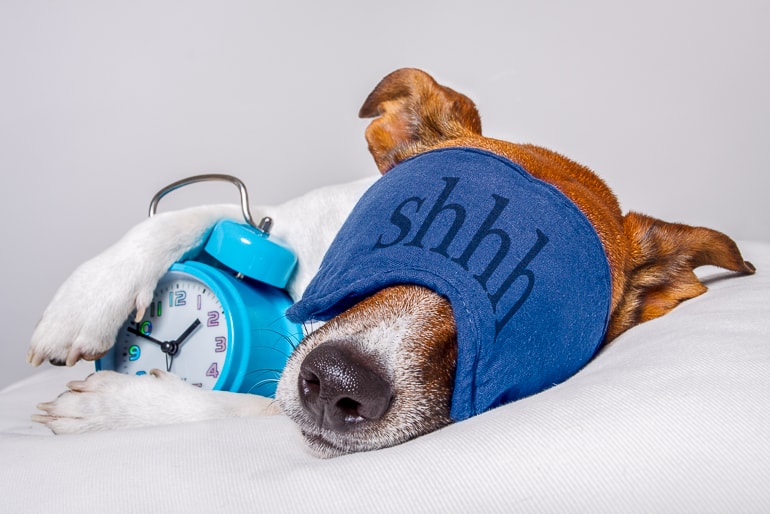
We know – easier said than done, right? It can be hard to sleep when your mind is racing at a million miles per second. But, hear us out. A rested body and mind have more resilience stored away. Resilience, as we explain in our post on the benefits of hiking, is our ability to adapt to and cope with stressors. It’s something you build up and lose – like a battery gaining or losing its charge.
If you have no resilience (ability to cope) built up, then thoughts just trample through your mind. Sleep is a great way to build that resilience back up each day. There are other ways to do so but generally making sure you are well rested is a great way to do so. Sleep also benefits us by resting our brain, our bodies, can act as a “reset” on the day.
Listen to Music
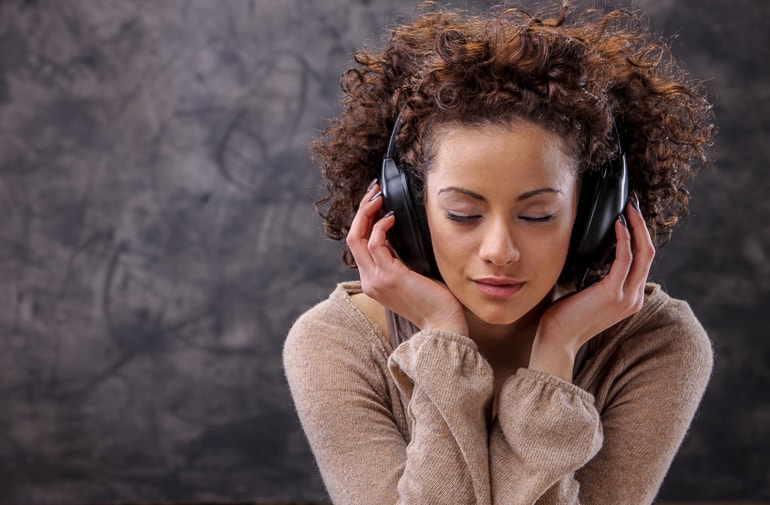
A great way to reduce anxiety in an instant – and to help keep it down over the course of a day or week – is to listen to music. Here’s the catch – no one type of music works for everyone!
While you might think that calm, classical music works for most, Bruce actually found that upbeat, energetic music increased his mood. He was able to focus on the pace and the tempo instead of the thoughts trailing through his brain. Interesting, huh? Give it a try, big headphones on (like these ones similar to Bruce’s), and see what happens for you!
Acknowledge That You Are Doing Your Best
If you’re a perfectionist with anxiety, this one is super important. Often times, it’s the details in the day to day (or not achieving them) that can get to you. One of the best realizations that you can have is that “you are doing the best that you can and that it IS good enough”.
Bruce is a bit of a perfectionist – and this one was always hard. Imperfection was a failure. This is false – and years later it’s so easy to see how flawed this logic is. Don’t aim for perfection – the pursuit of the details will weigh you down. Guaranteed. You’ll miss the fact that you are accomplishing things by focussing on the fraction that isn’t perfect.
Laugh
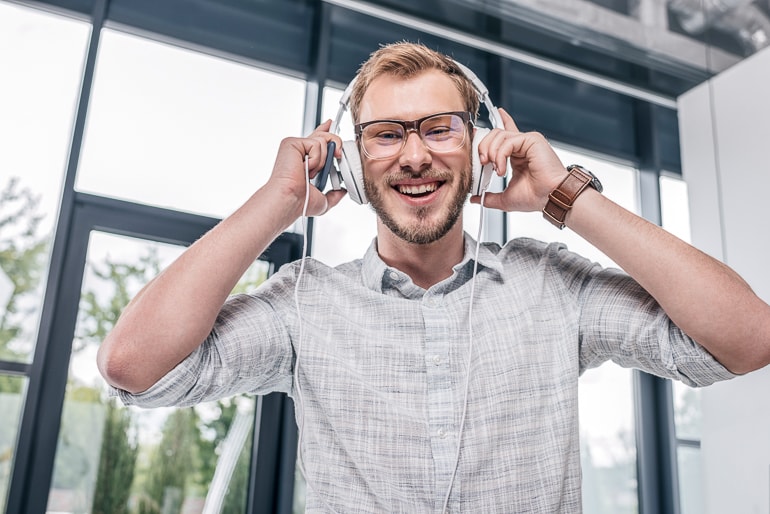
Laughing is good for you anyways. Laughing (or enjoying something) releases endorphins – which contribute to feelings of happiness in the brain. We all have Netflix and YouTube – so watch a comedy show, watch dog videos, watch something that you enjoy.
Better yet, invite a friend over to watch a funny movie. Even better – grab tickets to see a comedian. Passively sitting in a dark room just letting your mind focus on an act (and laughing) can be a good way to kill a few birds with one stone!
Try to Shift your Mindset
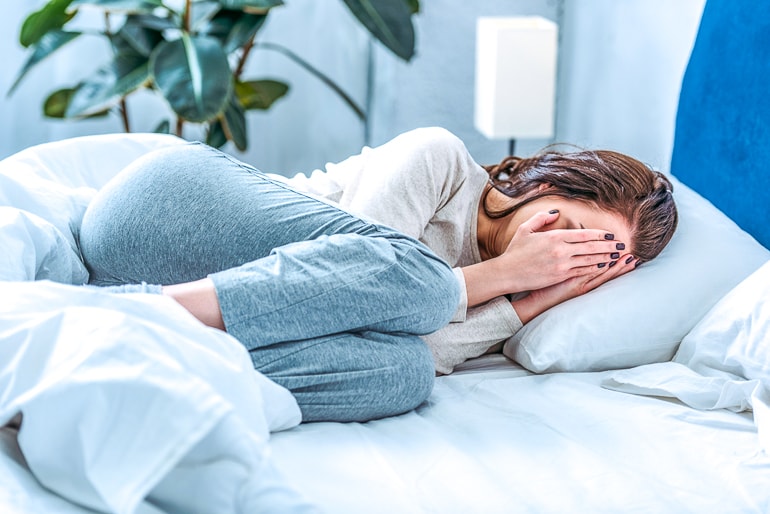
Again – it sounds like one of those stupid obvious ones but hear us out. We don’t mean “just stop being anxious” because that would be ridiculous to expect. What we do want you to try doing or consider is actively and consciously choosing to stay positive in certain situations that arise. Rewiring your brain is a powerful tool and it is possible.
What worked for Bruce was visualization. Each time anxious feelings came on, he visualized a cloud passing on the horizon. He off-loaded all the negatives to the cloud… and watched them pass into the horizon. Visualization is a powerful tool and perhaps it should be its own category but oh well, we think it fits here in the “rewiring” section.
Another realization that you can have is this: You need to accept that you are not in control of everything that happens to you but that you are absolutely in control of other aspects of your life. As with most things in this post, we want to write up another piece on visualization techniques and “rewiring” techniques so check back soon!
Read Also: 25 Growth Mindset Quotes That Will Motivate You
Keep Busy
This one is self-explanatory – but keeping your mind occupied with tasks and meaningful things can help to deflect and suppress anxious feelings. Volunteer, give back to your community, play music, make yourself useful – just do something meaningful with your time.
Often working in the service of others increases your good feelings while helping to eliminate the negative feelings that often build up. Anxiety is that build up of “badness” – so nip it in the butt before it gets to that level!
Avoid Caffeine and Alcohol
Even if you like going out for a beer or need a cup of coffee to run in the morning, either try to cut back OR change your daily habits. They could make a difference in how your mood is formed and how your brain ticks throughout the day.
It can be argued that being social and going out with friends (even if you are anxious) can be a good thing – and we would agree. Where you could consider drawing the line is having a drink or two when you are out. Alcohol can numb the thoughts – but it’s not a long-term (or healthy) solution.
When you are experiencing high levels of anxiety, caffeine can send your mind into hyperdrive and make it race faster. Now, if you need coffee in the morning, then have that cup but avoid prolonged caffeine throughout the day. This excess of caffeine (maybe you take frequent coffee breaks to clear your mind) can actually be doing more harm than good.
And there you have it – 14 of our tips for reducing and coping with anxiety on a daily basis. In the end, not all of these will work for everyone. You have to try out different strategies and tactics and see what works for you.
Your mind is unique so are you! Anything we didn’t mention? Any advice you want to share? Hit us up on Twitter @boardandlife – we’d love to hear from you!
As always, Stay Curious,
-B&L
Pin it for later!
